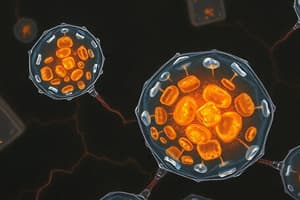Podcast
Questions and Answers
What is the process called when a cell becomes specialized to perform a specific function?
What is the process called when a cell becomes specialized to perform a specific function?
- Meiosis
- Mitosis
- Replication
- Differentiation (correct)
Embryonic stem cells have a limited ability to differentiate compared to somatic stem cells.
Embryonic stem cells have a limited ability to differentiate compared to somatic stem cells.
False (B)
Name one type of specialized cell and its function.
Name one type of specialized cell and its function.
Neuron, conducts nerve impulses
The process of ________ involves stem cells activating different genes to differentiate into specialized cells.
The process of ________ involves stem cells activating different genes to differentiate into specialized cells.
Match the type of stem cell to its origin:
Match the type of stem cell to its origin:
Which of the following is NOT a challenge associated with stem cell research?
Which of the following is NOT a challenge associated with stem cell research?
Induced pluripotent stem cells (iPS) can help avoid organ rejection because they originate from the patient's own cells.
Induced pluripotent stem cells (iPS) can help avoid organ rejection because they originate from the patient's own cells.
What are transcription factors?
What are transcription factors?
Stem cells have the potential to develop into any specialized cell type, while __________ stem cells have more limited capability.
Stem cells have the potential to develop into any specialized cell type, while __________ stem cells have more limited capability.
Which type of stem cell is capable of differentiating into red blood cells, white blood cells, and platelets?
Which type of stem cell is capable of differentiating into red blood cells, white blood cells, and platelets?
Flashcards
Cell Differentiation
Cell Differentiation
A cell becomes specialized to perform a specific function.
Stem Cells
Stem Cells
Cells that can develop into any type of specialized cell in the body.
Embryonic Stem Cells
Embryonic Stem Cells
Found in developing embryos, can become any type of cell in the body.
Somatic Stem Cells
Somatic Stem Cells
Signup and view all the flashcards
Gene Regulation
Gene Regulation
Signup and view all the flashcards
Transcription Factors
Transcription Factors
Signup and view all the flashcards
Internal Cues
Internal Cues
Signup and view all the flashcards
External Cues
External Cues
Signup and view all the flashcards
Regeneration
Regeneration
Signup and view all the flashcards
Induced Pluripotent Stem Cells (iPS)
Induced Pluripotent Stem Cells (iPS)
Signup and view all the flashcards
Study Notes
Cell Differentiation and Specialization
- Cells differentiate to become specialized cells.
- Differentiation means a cell becomes specialized to perform a specific function.
- This process is critical for multicellular organisms as it creates diverse cell types with specialized functions.
- Example: Neurons conduct nerve impulses, muscle cells contract for movement.
- Cells differentiate from unspecialized cells called stem cells.
Stem Cells
- Stem cells are undifferentiated cells with the potential to develop into any specialized cell type.
- Examples: Bone marrow stem cells – can differentiate into red blood cells, white blood cells, and platelets.
- Types of Stem Cells:
- Embryonic stem cells: Found in developing embryos. Possess the ability to differentiate into any type of body cell.
- Somatic stem cells: Found in adult tissues, examples include muscle, skin, liver, and bone marrow. Have a more limited differentiation ability compared to embryonic stem cells.
- Key Processes in Stem Cell Differentiation:
- Gene regulation: Stem cells activate different genes to create specific proteins, which influence the structure and function of the cell.
- Transcription factors: Proteins that determine which areas of DNA are activated and transcribed into mRNA.
- Internal cues: Transcription factors present in the cytoplasm of the original zygote cell or the specific location of the stem cell within a developing embryo.
- External cues: Cell-to-cell signaling or environmental factors like temperature.
Importance of Stem Cell Research
- Potential for regeneration: Stem cells might be used to regenerate organs or tissues damaged from disease or accidents.
- Challenges:
- Ethical concerns: Using embryonic stem cells raises ethical questions regarding the destruction of embryos.
- Organ/tissue rejection: Tissues or organs derived from stem cells not originating from the recipient could lead to rejection.
Induced Pluripotent Stem Cells (iPS)
- Potential for personalized medicine: Somatic stem cells can be induced to become pluripotent, meaning they can be reprogrammed back to a less specialized state.
- Benefits of iPS cells:
- Could differentiate into various cell types.
- May avoid organ rejection as they originate from the patient's own cells.
Current Research on Stem Cells
- Active research continues with promising potential for using iPS cells for tissue generation and therapeutic purposes.
- Understanding of stem cells is advancing rapidly.
Studying That Suits You
Use AI to generate personalized quizzes and flashcards to suit your learning preferences.


